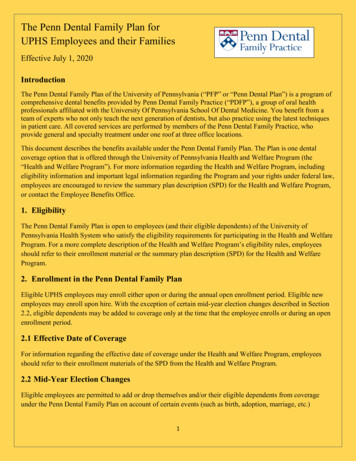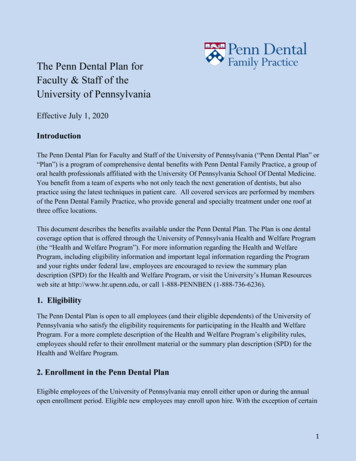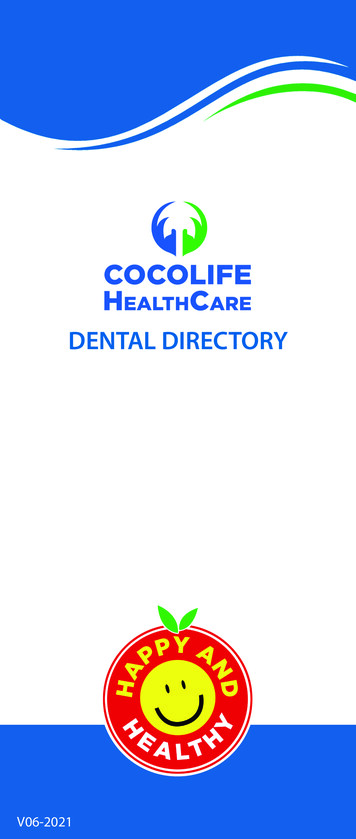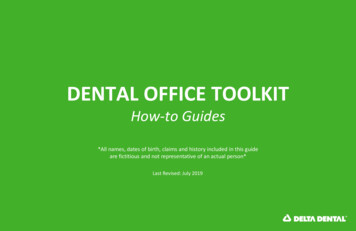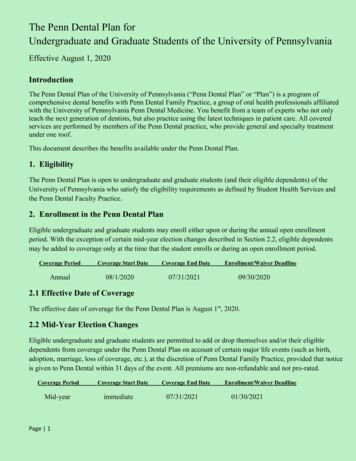
Transcription
The Penn Dental Plan forUndergraduate and Graduate Students of the University of PennsylvaniaEffective August 1, 2020IntroductionThe Penn Dental Plan of the University of Pennsylvania (“Penn Dental Plan” or “Plan”) is a program ofcomprehensive dental benefits with Penn Dental Family Practice, a group of oral health professionals affiliatedwith the University of Pennsylvania Penn Dental Medicine. You benefit from a team of experts who not onlyteach the next generation of dentists, but also practice using the latest techniques in patient care. All coveredservices are performed by members of the Penn Dental practice, who provide general and specialty treatmentunder one roof.This document describes the benefits available under the Penn Dental Plan.1. EligibilityThe Penn Dental Plan is open to undergraduate and graduate students (and their eligible dependents) of theUniversity of Pennsylvania who satisfy the eligibility requirements as defined by Student Health Services andthe Penn Dental Faculty Practice.2. Enrollment in the Penn Dental PlanEligible undergraduate and graduate students may enroll either upon or during the annual open enrollmentperiod. With the exception of certain mid-year election changes described in Section 2.2, eligible dependentsmay be added to coverage only at the time that the student enrolls or during an open enrollment period.Coverage PeriodAnnualCoverage Start Date08/1/2020Coverage End Date07/31/2021Enrollment/Waiver Deadline09/30/20202.1 Effective Date of CoverageThe effective date of coverage for the Penn Dental Plan is August 1st, 2020.2.2 Mid-Year Election ChangesEligible undergraduate and graduate students are permitted to add or drop themselves and/or their eligibledependents from coverage under the Penn Dental Plan on account of certain major life events (such as birth,adoption, marriage, loss of coverage, etc.), at the discretion of Penn Dental Family Practice, provided that noticeis given to Penn Dental within 31 days of the event. All premiums are non-refundable and not pro-rated.Coverage PeriodMid-yearPage 1Coverage Start DateimmediateCoverage End Date07/31/2021Enrollment/Waiver Deadline01/30/2021
2.3 Late EnrollmentCoverage for late enrollees may be possible only under certain conditions. After the enrollment deadline, onlythose students who have involuntarily lost health insurance coverage through a “Qualifying Life Event” such as1) removal from parent’s health insurance coverage after achieving a landmark birthday that disqualifies themfrom a parent’s health insurance plan or 2) losing private health insurance through loss of employment ordivorce, may apply for late enrollment. A certificate of credible coverage stating the date of the involuntary lossof health coverage and a signed application must be submitted to the Student Health Insurance Office within 31days of the qualifying life event. Please contact the Student Health Insurance Office at (215) 746-3535, option3 for details.3. Schedule of BenefitsThe Penn Dental Plan provides the following coverage:Type I Services – 100% Coverage Diagnostic and Preventive, including routine examinations and prophys/cleanings (limited to not morethan two times in a 12 month period), radiographs, fluoride applications and sealants (for children up toand including age 14), and oral hygiene counseling.Emergency treatment (palliative treatment for the relief of pain or discomfort). Other services performedduring emergency treatment will be covered at their usual benefit levels.Type II Services – 80% Coverage Basic restorations: Amalgams (silver colored restorations) and composites (tooth-colored restorations)for front and back teeth cavities are covered at the 80% rate. Coverage is contingent upon radiographicevidence showing the need for the composite for non-cosmetic purposes.Oral surgery (out of hospital only) including extractions, incision and drainage of abscesses,alveolectomy, and alveoloplasty, removal of oral cysts and tumors, and other routine oral surgicalprocedures performed in the office. The aforementioned services shall be covered by the Penn DentalPlan only if such services are not covered by the subscriber’s medical coverage. The Plan covers fullyand partial bony impacted third molars and the directly-related diagnostic and anesthesia expenses, onlyif denied in full by any and all medical coverage. Coordination of benefit rules apply and shall notexceed 80% of the treatment cost.Type III Services – 80% Coverage Periodontics: Surgical and non-surgical periodontics including subgingival curettage, scaling and rootplaning, periodontal maintenance.Endodontics, including pulp treatment, root canal therapy, pulpotomy, and apicoectomy.Type IV Services – 50% coverage Major restorations: including inlays, crowns (when necessary due to decay or fracture), and bridges.Page 2
Dentures, including complete upper and/or lower dentures, partial dentures, and relining and repair ofdentures.Space maintainers—prosthetic devices used in children to maintain the gap created by a missing toothuntil the permanent tooth emerges.Implants: surgery including restoration. Restorations on implants, including crowns and otherprostheses, are covered at the usual level for that restoration. The implant abutment (post that is placedin the implant fixture and anchors the crown), bone graft, and any other biological materials areexcluded from coverage. The Plan will only cover crown restorations for implants that were placed atPenn Dental. Please refer to section 3.3 for limitations and exclusions. The annual maximum benefit forimplant surgery is 1,500. This implant benefit will be applied to the annual maximum Plan benefit of 1,500.Occlusal Nightguards (processed in an outside laboratory or at Penn Dental)Please refer to the limitations and exclusions section.Type V Services – 50% coverage Orthodontics: includes one orthodontic treatment per lifetime for children and adults. Indications fororthodontics are an overbite of at least four millimeters, a crossbite, or protrusive or retrusiverelationship of at least one cusp. Transfer of subscribers under treatment will be subject to a monthlytreatment fee, which will be covered at the 50% level. Subscribers in treatment when their Penn DentalPlan coverage is no longer in effect will have their orthodontic benefit prorated by the time remaining intreatment, subject to a 1,500 lifetime maximum benefit.Subscribers must be a candidate for Invisalign as determined by a Penn Dental doctor.The lifetime orthodontic benefit counts towards the annual maximum Plan benefit of 1,500.3.1 Copayments and DeductiblesFor Type II, III, and IV services, there is a 50 Plan year August 1-July 31 deductible that applies. Themaximum deductible per individual per year is 50. Copayments are dependent on the type of services providedand are due at the time of treatment. For specific copayments, contact your Penn Dental office. Arrangementscan be made with the billing staff for individual payment plans through Care Credit, such as those for crown andbridge treatment and orthodontics.3.2 EmergenciesEmergency care is provided for subscribers of the Penn Dental Plan on a 24-hour basis. If an emergency occursoutside of normal business hours, the subscriber should call (215) 898-7337 or any Penn Dental office for areferral to the emergency provider on call.3.2.1 Out-of-the-Area Emergency CareIn the event that an emergency occurs when the subscriber is more than 100 miles away from one of the PennDental Family Practices, palliative treatment (treatment to alleviate the immediate discomfort) from a non-planPage 3
dentist is covered by the Penn Dental Plan. Examples of emergencies are pain, fever, swelling, bleeding, or lossof a tooth.Treatment from a non-plan dentist should be limited to palliative treatment. Follow-up care must be providedby Penn Dental in order to be covered.To receive reimbursement from the Penn Dental Plan for palliative treatment, the subscriber must submit anitemized bill with procedure codes and receipt of payment from the dentist who provided the emergencytreatment. If x-rays were taken, they must also be included or forwarded electronically.The subscriber is responsible for all out of pocket expenses incurred for the emergency care treatment. Thesubscriber shall receive reimbursement from the Penn Dental Plan for the palliative emergency services at a rateequal to the Penn Dental fee for the same or similar service, subject to the Plan coverage and limitations. Thesubscriber is responsible for any fees charged by the dentist who provided emergency treatment that are inexcess of those charged by Penn Dental.3.3 Limitations and ExclusionsThe maximum annual benefit per plan year (August 1-July 31) for each individual is 1,500.The Penn Dental Plan will NOT cover: An appliance or modification of one, where an impression was made before the subscriber was covered.Root canal therapy if the pulp chamber was opened before the subscriber was covered.Fixed prosthetics (including implants) and full or partial denture at any stage of fabrication prior tocoverage. In the case of out-of-area emergency treatment for these partially-completed procedures,coverage is subject to the approval of the Clinical Director.Other procedures not covered by the Penn Dental Plan include, but are not limited to, the following: Services, procedures, or supplies not provided by Penn Dental, except for emergency services covered inSection 3.2.1.Services provided under any government program or law under which the individual is, or could be,covered as determined by the Penn Dental Plan Administrators.Coverage for a restoration (bridge, crown, removable denture or implant) of a tooth or teeth missing orextracted prior to enrollment in the Penn Dental Plan is subject to the approval of the Clinical Directorand may be denied.Unserviceable appliances that meet all of the other criteria for replacement will be replaced by sametype appliances or an alternative benefit for enhanced prosthetic choices can be applied at the discretionof the Penn Dental Plan Administrator.Replacement or upgrade of a previous restoration (bridge, crown, removable denture of implant) that isless than 60 months old. If the restoration was not performed in one of the Penn Dental offices, thesubscriber is responsible for obtaining documentation of the restoration’s age.For implants that were placed by Penn Dental within the past five years, the Plan will not cover aremovable partial denture placed in the same immediate area.Occlusal appliances, other than for bruxism.Page 4
Procedures necessary to alter the vertical dimension or to restore occlusion by splinting.Splinting teeth with permanent restorations (crowns) for periodontal purposes.Services necessitated by an accident related to employment or disease covered under the workers’compensation or similar law.Abutments, bone grafts and biological materials, such as membranes, for dental implants (which must bepaid for before delivery of such materials).Prosthetic superstructure over implants (crowns, bridges, attachments, dentures) if the implant itself wasnot covered under the Penn Dental Plan).Replacement of lost or broken orthodontic appliances.Oral surgery and related expenses in a hospital.Dentistry requiring hospitalization except preauthorized pediatric dentistry covered at Penn Dental Planbenefits.General anesthesia—Conscious (IV or Oral) sedation—for basic dentistry services (i.e. fillings,extractions, etc.). For complex extractions, the Penn Dental Plan Office will submit to your medicalcarrier for coverage.Treatment of temporomandibular (TMJ) dysfunction. No TMJ appliances.Dentistry primarily for cosmetic purposes.A service provided while the subscriber’s coverage is not in effect, except as provided under Section 5.1.Nitrous oxide.Preventive sealants on adults over the age of 15, sealants covered to age 14 only.Fluoride treatments for subscribers older than 15 years of age.Oraquix (needle-free anesthetic) tissue anesthesia.4. Cost of CoverageSubscribers must pay the premium for coverage at the time of enrollment. Once student eligibility is establishedat the enrollment site you may enroll yourself and dependents and select credit card or student account billingfor payment option.5. Termination of CoverageIn general, coverage for the subscriber and eligible dependents will terminate if the subscriber ceases to be aneligible student of the University of Pennsylvania or if the Penn Dental Plan is discontinued by the University ofPennsylvania.5.1 Extension of BenefitsIf coverage under the Penn Dental Plan is terminated for the subscriber or a family member, the protection willbe extended to cover treatment in progress or basic services received within the next 30 days provided that theseservices would have been covered had the Penn Dental Plan remained in effect. Payment for treatment receivedafter this extension period will be on a fee-for-service basis.Page 5
6. Subscriber ResponsibilitiesSubscribers to the Penn Dental Plan are expected to: Seek all dental care from Penn Dental (this Plan is not accepted at the School of Dental Medicine studentclinics).Pay deductibles and their co-payments for covered services at the time of the visit.Notify Penn Dental of any changes in status affecting covered dependents.Give at least 24 hours’ notice for cancellation of appointments. If a subscriber or his/her dependents failto give advance notice (minimum 24 hours), a letter will be sent notifying the subscriber that futurefailed or broken appointments (less than 24 hours) will generate a fee. This fee will increase with futurefailed or broken appointments. Subscribers must pay all failed or broken appointment fees beforescheduling future appointments for dental treatment.Notify their provider at their next appointment of any changes in medical history, including medications.Be present for the entire visit when a minor child is having dental treatment and sign a treatment plan forthe child.Be on time for all appointments.Maintain good dental health habits.7. Changes in Family StatusNotify Penn Dental of any changes in family status affecting covered dependents.8. Coordination with Other PlansThe Penn Dental Plan contains a provision that coordinates the benefits it pays on behalf of an individual withpayments that may be made under other plans covering the individual so that the total benefits available will notexceed 100% of the allowable expenses.An allowable expense is any necessary, reasonable, and customary expenses covered, at least in part, by one ofthe “plans.” For this purpose, the terms “plans” refer to the following types of medical and dental care benefitprograms: (a) coverage under a government program or coverage required by statute, including no-faultcoverage to the extent required in policies or contracts by a motor vehicle insurance statute or similarlegislation; and (b) group insurance through employment or other coverage obtained through an educationalinstitution above the high school level.When a claim is made, the primary plan pays its benefits without regard to any other plans. The secondary plansadjust their benefits so that the total benefits available will not exceed the allowable expenses. The Penn DentalPlan will not pay more than it would have paid if there were no other plan. A plan without a coordinationprovision is always the primary plan. If all plans have a coordination provision, the plan covering the subscriberdirectly, rather than as a dependent, is the primary plan. If both parents cover a dependent child, except forsituations where the parents are separated or divorced, the plan of the parent whose date of birth (month, day)falls earlier in the calendar year is the primary plan for that child. If both parents have the same birth date, theplan that covered the parent longer shall be primary.Page 6
9. Statement of Rights of Student Health ServicesAs with any other coverage option, Student Health Services reserves the right to amend or terminate the PennDental Plan, in whole or in part, at any time.10. Resolution of Questions Regarding Services and BillingIf a subscriber believes that he/she has not been provided with sufficient information about the Penn Dental Planor has been denied a benefit under the Penn Dental Plan, the subscriber may file a written claim with:Penn Dental Student Plan Administrator240 S. 40th Street, Schattner Building, Suite 300Philadelphia, PA 19104askPDFP@dental.upenn.edu11. Miscellaneous InformationPlan Administrator:Erika N. GrossDirector, Finance, Administration and Risk ManagementStudent Health Services3535 Market Street, Suite 100Philadelphia, PA215-746-0821 - directPlan Year:The Plan year begins each August 1st and ends July 31st. Premiums paid by the subscriber for the Plan year arenon-refundable.Page 7
The Penn Dental Plan of the University of Pennsylvania ("Penn Dental Plan" or "Plan") is a program of . from a parent's health insurance plan or 2) losing private health insurance through loss of employment or divorce, may apply for late enrollment. A certificate of credible coverage stating the date of the involuntary loss


